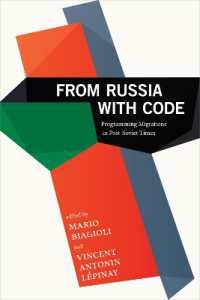- ホーム
- > 洋書
- > 英文書
- > Philosophy
Full Description
Thinking Freedom in Africa conceives an emancipatory politics beginning from the axiom that 'people think'.
Previous ways of conceiving the universal emancipation of humanity have in practice ended in failure. Marxism, anti-colonial nationalism and neo-liberalism all understand the achievement of universal emancipation through a form of state politics. Marxism, which had encapsulated the idea of freedom for most of the twentieth century, was found wanting when it came to thinking emancipation because social interests and identities were understood as simply reflected in political subjectivity which could only lead to statist authoritarianism. Neo-liberalism and anti-colonial nationalism have also both assumed that freedom is realizable through the state, and have been equally authoritarian in their relations to those they have excluded on the African continent and elsewhere.Thinking Freedom in Africa then conceives emancipatory politics beginning from the axiom that 'people think'. In other words, the idea that anyone is capable of engaging in a collective thought-practice which exceeds social place, interests and identities and which thus begins to think a politics of universal humanity. Using the work of thinkers such as Alain Badiou, Jacques Rancière, Sylvain Lazarus, Frantz Fanon and many others, along with the inventive thought of people themselves in their experiences of struggle, the author proceeds to analyse how Africans themselves - with agency of their own - have thought emancipation during various historical political sequences and to show how emancipation may be thought today in a manner appropriate to twenty-first century conditions and concerns.
Contents
Foreword by Ernest Wamba-dia-Wamba; Preface; Acknowledgements; General Introduction: Politics is thought, thought is real, people think; Part One Understanding Subjective Political Sequences; From African History to African Historical Sequences; Theoretical Introduction: understanding historical political sequences; Chapter 1 From Saint Domingue to Haiti and the Politics of Equality: The Human Freedom Mode of Politics and its Afterlives 1791 - 1796, 1804 - 1960; Chapter 2 Are Those-who-do-not-count Capable of Reason? On the limits of historical thought; Chapter 3 The National Liberation Struggle Mode of Politics in Africa 1945 - 1975; Chapter 4 South Africa and the People's Power Mode of Politics 1984 - 1986; Chapter 5 From Emancipatory Nationalism to National Chauvinism in South Africa: 1973 - 2013; Chapter 6 Rethinking Militancy and Popular Politics; Conclusion to Part One: Understanding Fidelity to the South African Emancipatory Event: the Treatment Action Campaign and Abahlali baseMjondolo; Part Two Opening up the Thought of Politics in Africa Today - Exceeding the Limits of Sociology beyond Representation Theoretical Introduction: social representation, modes of rule and political prescriptions; Chapter 7 Marxism and the Politics of Representation: the 'agrarian question' and the limits of political economy; Chapter 8 Thinking beyond Representation, Acting beyond Representation: understanding worker subjectivities in South Africa toda; Chapter 9 Renaming the State in Africa today; Chapter 10 State Domains of Politics and Systemic Violence in Africa today; Chapter 11 Rethinking the Domain of Civil Society and its Politics; Chapter 12 Rethinking the Domain of Traditional Society and its Politics; Conclusion to Part Two: Toward a Politics of Solidarity; General Conclusion: Constituting the Domain of Freedom: thinking politics at a distance from the state; Bibliography; Index.







